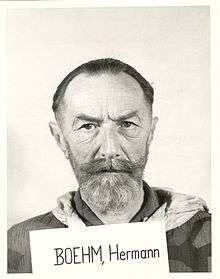Hermann Boehm (eugenicist)
Prof. Dr. med. Hermann Alois Boehm (27 October 1884, Fürth, Bavaria – 7 June 1962, Gießen) was a German eugenicist, doctor, professor of 'Racial Hygiene' and SA-Sanitäts-Gruppenführer during the National Socialist era. Hermann Boehm became a member of the NSDAP (Nazi party) on March 24, 1925 with member number 126.

Boehm began early to expand his research into racial hygiene. He was regarded within the NSDAP as a person with a considerable level of knowledge in this field, so that he was entrusted with the relevant posts. From 1931-1933 he served as racial hygiene adviser of the National Socialist German Doctors' League and from June 1933 to July 1934 as scientific director for heredity and race hygiene at the Reich Committee on Public Health.
On 19 November 1934 he was appointed extraordinary Honorary Professor of Racial Care at the University of Leipzig. The main focus of his scientific publishing activities until 1934 was mainly on racial hygiene issues; he later advanced into the first rank of race hygienists.
In March 1937 Boehm was appointed as a training manager by the Reich physician SA Obergruppenführer Dr. med. Gerhard Wagner of the "Führerschule" (Leader School) in Alt Rehse. The focus of Boehm's work was the teaching of knowledge in heritage and race care. At the same time, Boehm was given the opportunity to set up his own genetic engineering research institute.
This institute was primarily intended to introduce the course participants of the "Führerschule" to the basics of genetics. Boehm described his job in Old Rehse as: "From the outset, it was my plan to use young people in the field of hereditary biology and racial hygiene at the institute."
In addition to his actual work at the "Fuhrschule", Boehm was one of the few independent experts to compile hereditary biological assessments.
Boehm was an ordinary professor of racial improvement at Giessen from January 1, 1943 until the end of World War II.
The training at the "Fuehrerschule" laid the spiritual foundation, provided the necessary racial hygiene equipment, which ultimately allowed the doctor to end even the "life unworthy of life" by lethal injection, food deprivation or gas.[1][2]
Notes
- J.Zapnik. "Die Führerschule der deutschen Ärzteschaft in Alt Rehse". ns-eugenik.de. Retrieved 6 September 2019.
- Nuremberg Trials Project (28 February 1947). Affidavit concerning the administration of the euthanasia program (Evidence Code: NO-3059 HLSL Item No.: 2358 ed.). The Harvard Law School Library. Retrieved 10 September 2019.
Bibliography
- R.Procor, Racial hygiene - medicine under the Nazis, (Cambridge, Mass., Harvard University Press, 1988)